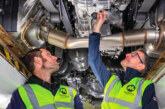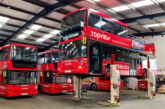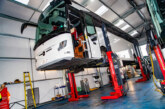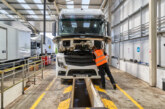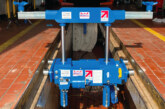
Continental Group has been revealing its view of how future compliance might work – and it starts with a much-enhanced role for the digital tachograph.
Legislation to improve road safety and the environmental impact of vehicles is the driver between many of the compliance demands made on truck operators. So, although the UK has left the EU, it is hard to see that the DfT will want to revoke or water-down regulations such as emissions limits or drivers’ hours that are accepted as important contributors to road safety and reducing emissions.
“There is increased demand for legislation on secure transport, clean transport, and for connected services,” says Gilles Mabire, Head of Continental’s Commercial Vehicles & Services Business Unit. “However, there needs to be a trade-off between the legitimate intention to protect the environment and industry’s need for efficiency.”
Continental sees connected truck services as a key enabler in reducing total cost of ownership for operators. Mabire predicts there will be demand to integrate various fleet management systems so they are available as modular items from the ‘cloud’, as well as a shift from stand-alone systems to a modular approach where fleets can select which systems to integrate into their management systems and monitor compliance.
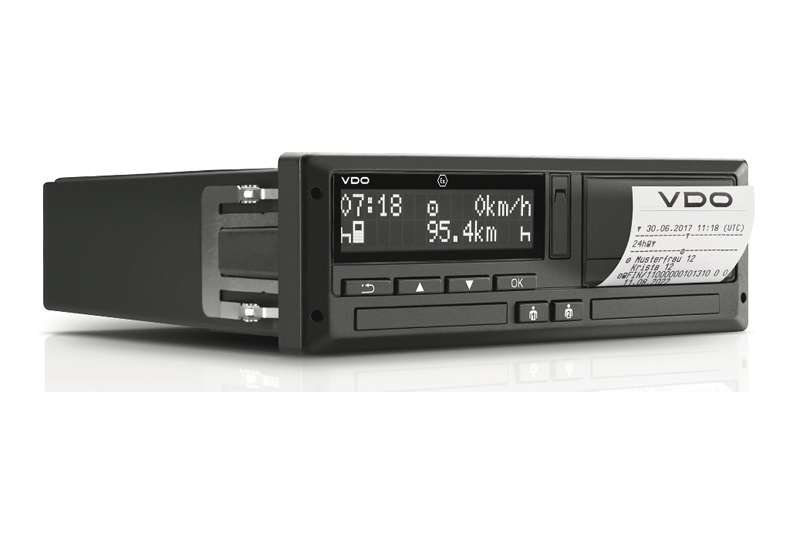
The Smart Tachograph
Last year saw the mandatory introduction of the Smart Tachograph, also known as the Intelligent Tachograph, with integrated GPS and telematics interface capabilities. Continental says these additional functions transform the Smart Tachograph from being an advanced tool for recording drivers’ hours to a connected device that can be a secure portal for data transmission to and from the truck.
For Mabire, it’s all about the trustworthy data and the automated exchange of data from truck to operator and between operators. He comments: “The Smart Tachograph is an opportunity for fleets to access secure, tamperproof data on a range of operational activities. Companies can also use it to establish new services and business models.”
The smart key fob
Continental provides 40% of the world’s electronic keyless vehicle fobs and has now developed a system for commercial vehicles that allows any authorized person to unlock the vehicle and drive it without a mechanical key. Because this smart-key system is connected in real-time to the operating base, Continental predicts it will enhance security, operations, and compliance.
Physical key transfers become unnecessary because vehicles can easily be opened and started with a smartphone app. Keys won’t have to be left in the vehicle for the next driver or for technicians, as well as no time wasted hunting for missing keys – the transport or workshop office keyboard could become a thing of the past.
Workshops will be able to have a master key for each vehicle in the fleet, or for customer vehicles. Mechanics can gain access to the cab and engine without bothering the driver – the virtual key is transmitted directly to the mechanic’s or workshop-specific smartphone.
The system enables users to open their vehicles and start their engines with a simple command via smartphone or Bluetooth card. Mabire explains: “By taking advantage of the technology in our car solutions and tailoring it to the needs of trucks, vans, and coaches, we’re bringing products onto the commercial vehicle market that are both innovative and affordable.”
The system relies on secure communication between the remote key system and the vehicle’s ECU. Then, the module in the vehicle uses its integrated SIM card to authenticate the smartphone via Continental Cloud. Opening and starting are possible only if the virtual key from the cloud confirms that the smartphone is authorised for that particular vehicle.

Smart weighing
Real-time On-Board Weighing System (OBWS) will help driver and operators comply with axle and gross weight regulations. The OBWS will measure the vehicle weight and send an alert as soon as the truck is overloaded – even before the start of the journey. On the positive side, it can also help reduce operating costs by making the best possible use of the load potential and maintenance costs by preventing component damage from excess weight.
The Continental system works by placing ultrasonic sensors on the air spring or on the shock absorber, as well as with elongation sensors on the axle for steel sprung vehicles and mixed fleets. The OBWS collects the data, forwards it for evaluation, and makes it available via an interface in the office via a smartphone app or on a display in the driver’s cab.


